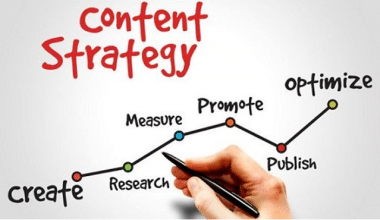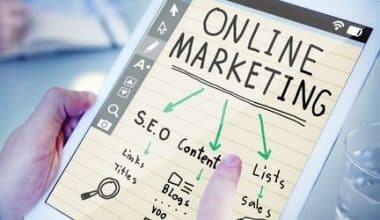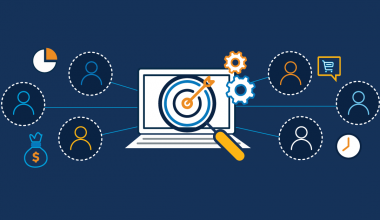Internet marketing is an all-inclusive term for marketing products and services online. This includes a variety of communication methods and platforms, such as websites, email, social media, and online advertising. To ensure that your company reaches the right people among the four billion, we’ll cover everything from free Internet marketing strategies to real-world advertising.
What is Internet Marketing?
Internet marketing, also referred to as online marketing or web advertising, is a type of marketing that makes use of digital channels like search engines, email, websites, and social media to reach customers with promotional messages.
Web design, SEO, email, social media, PPC, and other internet-related marketing strategies are examples of online marketing strategies.
What’s the Role of Internet Marketing?
Businesses can advertise, communicate with customers, and make sales through the Internet. The right Internet strategy can help with marketing and sales. The significance of digital marketing for business success stems from the fact that the majority of businesses and customers have become overly reliant on the Internet. Due to this dependence and the importance of having an online presence, structured Internet marketing is essential for businesses.
Let’s dive into two separate goals you’ll have with internet marketing, as well as the necessary methods you’ll want to take to achieve those goals.
#1. Internet marketing to attract new customers
Paid social media can bring in new customers for your company or product, but before you invest too much money in one social media platform, conduct market research and A/B testing. If you want to attract new customers, you must also maintain a strong SEO presence. New clients can be attracted through online marketing strategies. To accomplish this, you should prioritize paid social media marketing, search engine optimization, and web design.
#2. Internet marketing to cultivate brand loyalties
Customers have long controlled brand perception through word-of-mouth. It has always been up to the consumers, even though businesses can provide good products, advertise them, and try to steer branding in a certain direction. Today, word-of-mouth is much more common and has moved online. And it’s accessible to everyone via various social media sites. Because marketing and advertising have become less effective, your consumers and potential customers rely on reviews and the opinions of their peers to judge the quality of your brand.
Traditional Advertising vs. Content Marketing
The goal of content marketing is to provide value to the audience while also demonstrating thought leadership. The brand as a whole is typically the focus of traditional advertising, in contrast. Both media make every effort to increase conversions. A slower and more deliberate approach is content marketing. Traditional marketing, on the other hand, focuses on audience targeting and quickly reaching a larger potential client, even if they haven’t requested to see your marketing.
For converting visitors and prospects into repeat customers, content marketing is a long-term, SEO-driven strategy. Traditional marketing, on the other hand, has a much shorter life cycle, consisting of a single attempt to advertise products or services to a specific target group.
Examples of Internet Marketing That Provide Value for Big Returns
Internet marketing reaches people from various online locations by leveraging their online activity to connect them with a business. Depending on its business model, products sold, target market, available resources, and other factors, a company will use different types of Internet marketing.
#1. Website content and design
Content marketing is the process of creating and disseminating content to attract and retain customers. Instead of focusing on selling, it concentrates on client communication, which is usually more well-liked.
#2. Email marketing
Email marketing refers to the practice of sending direct marketing communications to consumers via email to attract new customers and retain existing ones. It is one of the most cost-effective forms of marketing, and it can be used to target both a large and a highly specific customer base. The company can contact customers for future marketing initiatives when they provide a brand with their email address.
Social media marketing refers to the use of social media websites to promote a business and its goods and services. It aims to increase brand recognition, improve consumer interaction, foster loyalty, and generate sales leads. Paid advertising and organic marketing are both elements of a successful social media marketing plan. To pique interest and encourage client loyalty, organic social media marketing places a strong emphasis on community building and establishing relationships with customers.
#4. SEO
SEO is the process of improving a website and digital content to increase its organic or “natural” placement in search rankings. A website is more likely to be viewed by a potential consumer if it ranks higher in search results. Effective SEO efforts require extensive keyword research as well as the ability to create high-quality, useful content based on the chosen keywords. Some best practices for SEO that increase conversion rate include using relevant keywords, link-building, making your website mobile-friendly to improve user experience, and voice search optimization.
#5. Blogging
Blogging allows you to improve the SEO of your website by adding posts and blogs based on specific targeted keywords. Customers are more likely to find and visit your website as a result of an online search if you do this. They keep the website up to date and provide opportunities for audience participation. You can link to trustworthy websites, increasing client loyalty and expanding your audience.
#6. Podcasting and video
Videos and podcasts are two additional ways to inject personality into your marketing strategy. They allow businesses to use storytelling techniques to convey informative content and engage audiences. As your brand’s voice, you become more visible to listeners, which promotes deeper connections with your customers.
#7. Online advertising
There are numerous ways to market yourself online. PPC targets specific search phrases that potential customers might use. Numerous websites, including blogs, magazines, and news sites, have banner advertising available.
Search engine advertising allows you to effectively purchase your way to the top of search results. This strategy can be useful when your website is brand new or there is fierce competition for market share because these circumstances make it difficult to achieve a high position naturally.
#8. Influencer marketing
Working with influencers to promote your brand’s messages, products, or services is known as “influencer marketing.” Influencer marketing combines traditional and cutting-edge marketing techniques. It takes the idea of a celebrity endorsement into a content marketing campaign for today’s time. In the case of influencer marketing, the main difference is that the campaign results in collaborations between brands and influencers.
#9. Infographics
Infographics are an innovative way to present complex information in an understandable format. Also, infographics break up the monotony of text by using charts, photos, graphs, and illustrations to provide readers with a lively, colorful visual to help them understand (and share) important knowledge. They understandably convey important information and are appealing and simple to follow.
#10. Paid promotions and sponsorships
You can also use the online audience of another person to advertise your goods or services through sponsored sponsorships and promotions. Paid promotions and sponsorships can help you reach your target audience online in a variety of ways. Identifying the marketing techniques that are best suited to your company is the most important thing to do.
Advertising and Marketing on the Internet
Online advertising is a type of marketing and advertising that uses the Internet to promote products and services to audiences and platform users. It is also known as online marketing, Internet advertising, digital advertising, or web advertising. Email marketing, search engine marketing (SEM), social media marketing, numerous forms of display advertising (including web banner advertising), and mobile advertising are all examples of online advertising. Programmatic advertising refers to the delivery of advertisements through automated software systems that operate across multiple websites, media services, and platforms.
Online advertising, like other forms of advertising, frequently entails a publisher who incorporates advertisements into its online content and an advertiser who provides the advertisements to be displayed on the publisher’s content. Advertising agencies that help generate and place the ad copy, an ad server that delivers the ad technologically and tracks statistics and advertising affiliates who do independent promotional work for the advertiser are additional potential participants.
How can I Advertise for Free on the Internet?
Small businesses mistakenly believe that all online advertising is prohibitively expensive. We want to dispel this myth. Numerous effective advertising formats do not require any investment. Investigate them.
#1. Make your website search engine friendly.
Every second, people all over the world conduct Google searches. They are looking for news, products, recipes, manuals, housekeeping tips, and much more. You can pique their interest while also bringing in new customers. Conduct some basic keyword research and select low-competition queries to begin your SEO.
#2. Send out email campaigns.
With their assistance, you can educate your customers, promote your products, share news and updates, keep clients informed about their orders, and increase brand recognition.
#3. Create guest posts.
Find authoritative blogs with a large readership who might be interested in your products. Offer them valuable content, tips, case studies, and advice. Your domain authority will increase if you link back to your website. This will help you communicate your message to your target audience and raise brand awareness.
There are at least two reasons why you should use them: most of the platforms are free, and people look for brands on social media. Advertising campaigns are not necessary if you are on a tight budget. Create a profile for your brand, upload photos and videos of your products, share news about recent updates, and solicit customer feedback.
#5. Create your blog.
A blog is a place where you can demonstrate your expertise while also promoting your brand. Post regularly to share company news, educate your audience, provide expert advice, and show some behind-the-scenes action. You can even make money from your blog by posting high-quality content from other companies that your audience may find useful.
These five free online advertising methods are just the tip of the iceberg, but they have been tried and tested in the real world. Check them out!
Do I Need Internet Marketing for My Business?
Internet marketing is becoming more and more important for all types of businesses. Every day, customers spend a significant amount of time online, including checking email, browsing social media, using search engines, and visiting websites.
Consumers use a variety of online methods to find, research and ultimately make purchasing decisions. Over 40% of consumers say they use Google Search first when looking for a product or service, and 26% say they shop online at least once a week.
However, social media pages and advertisements account for approximately 8% of consumers discovering retail websites. By creating broad Internet marketing platforms to help potential clients and customers find your business, you can take advantage of all these channels.
How to Develop an Internet Marketing Strategy in Four Steps
The Internet is vast, and there are many different types of Internet marketing to explore, making getting started intimidating. Before diving into every platform at once, take time to consider what might work best to build your online presence.
#1. Identify goals and set metrics
Consider your goals for internet marketing and your success metrics. Will you concentrate on boosting sales? If so, the conversion rate—the percentage of website visits or ad clicks that result in a sale—is an important metric to track success.
#2. Define your intended audience.
You can meet your target audience where they are if you know who they are. For example, the Pew Research Center found that older internet users are more active on Facebook, whereas younger people are more likely to be found on Instagram. Knowing this type of information can assist you in reaching out to potential customers.
#3. Plan your marketing strategy.
You can devise a strategy to achieve your objectives once you have determined them. A small business that sells sustainably sourced baby clothes and wants to raise brand awareness, for example, might concentrate on campaign strategies that help it reach its target audience: new parents who have expressed an interest in environmentalism and sustainable fashion.
#4. Execute and monitor
As you implement your internet marketing campaigns, track key metrics like followers, engagement, site traffic, conversion rate, and sales. In that case, you may want to invest more in your content marketing strategy in the future, or you may want to figure out how to effectively distribute the content on other platforms.
What are the 4 Ps of Internet Marketing?
Product, price, place, and promotion are the four Ps.
What are the Benefits of Marketing on the Internet?
- Global reach – for a small investment, a website allows you to find new markets and trade globally.
- Lower cost – Compared to traditional marketing methods, a well-planned and well-targeted digital marketing campaign can reach the right customers for much less money.
What are the 7 steps of Internet Marketing Strategy?
A Successful Digital Marketing Strategy: How to Develop It
- Determine the potential.
- Define digital marketing’s function.
- Recognize your intended audience.
- Use a Multi-Channel Strategy.
- Determine the resources required.
- Make an execution plan.
- Support your digital transformation strategy.
What is the Key Element of Successful Internet Marketing?
Responsive Website With Engaging Content
Your website is the cornerstone of any marketing strategy because it is the first place that prospective customers will go to learn more about your company.
What are the Challenges of Internet Marketing?
If you engage in online marketing, you may encounter some of the following difficulties.
- Putting mobile content first
- Make your website dynamic.
- Creating excellent content on a regular basis.
- Allow customers to book in real-time.
- Making time to participate in social media
- Engaging social media followers
- Email marketing strategy
What is the Best Way to Make Internet Marketing Effective?
How to Market Yourself Online:
- Repurpose your high-quality content across multiple channels.
- Focus on long-term, non-expiring social media content.
- Select the appropriate keywords and optimize your site for search.
- Regularly publish blog posts.
- Conduct email marketing campaigns.
- Publish online press releases.
How Do You Create an Effective Internet Marketing Strategy?
Here’s how to develop an effective digital marketing strategy:
- Investigate the landscape and evaluate your findings.
- Plan your strategy.
- Define your target market.
- Build your content strategy.
- Choose your channels and tactics.
- Set key performance indicators and benchmarks.
- Use best practices when carrying out your tasks.
- Analyze and make adjustments.
Conclusion
All online advertising of goods and services is referred to as “Internet marketing.” Regardless of the size or scope of your business, you can develop an extensive Internet marketing strategy that makes it easier for customers and clients to find you by utilizing a variety of online channels and methods of communication.
Related Articles
- MARKETING SERVICES: Digital Marketing Services & Contracts
- WEB MARKETING: Examples, and Best Strategies
- DIGITAL MARKETING BUSINESS: 2023 Unique Ideas & How-to-Start Guide
- MARKETING COMPANY: Types, Services, and How to Start One
- WEB MARKETING SEO: Meaning, Advantages & Types





